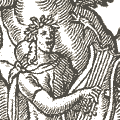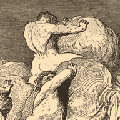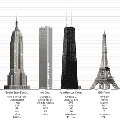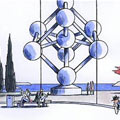Uitspraken van de woestijnvader Abba Filemoon
In het tweede deel van de Philokalia is een tekst opgenomen over het leven van Abba Filemoon. Deze woestijnvader moet geleefd hebben na Arsenios de Grote, maar voor de verovering van Egypte door de Muzelmannen, dus ergens tussen 445 en 640. Hij spreekt veel over het Jezusgebed (“Heer Jezus Christus, Zoon van God, ontferm U over mij zondaar“), dat hij ook wel de ‘verborgen overweging’ of de ‘eenvoudige overweging’ noemt, als dé juiste houding om het hart te bewaken.
Want als onze ziel geniet van de beschouwing van het aanwezige Goed, wendt zij zich niet naar het genot dat de hartstochten teweegbrengen.
Er is dus geen andere weg naar de hemel dan die van de volmaakte stilte, van het ontvluchten van alle ondeugden, van de verwerving van alle goeds, van de volmaakte liefde tot God en van de verwantschap met Hem door heiligheid en rechtschapenheid. Wie dit alles bereikt heeft, zal spoeidig ten hemel stijgen. Maar als men tot deze hoogte wil geraken, moet men zijn ledematen op aarde geheel en al versterven (Kol. 3:5). Want als onze ziel geniet van de beschouwing van het aanwezige Goed, wendt zij zich niet naar het genot dat de hartstochten teweegbrengen. Zij heeft zich afgekeerd van alle lichamelijke lusten om met zuivere, onbevlekte overdenking Gods verschijning in zich op te nemen. Grote waakzaamheid, lichamenelijke hardheid en reinheid van ziel zijn nodig, wil God in ons hart Zijn woonplaats opslaan. Ook moeten wij Gods geboden nakomen zonder enige overtreding. Hij Zelf leert ons hoe we Zijn wetten feilloos kunnen onderhouden door Zijn eigen (goddelijke) daadkracht als zonnestralen in ons uit te storten door de Genade van de Geest die ons geschonken is.
vertaling: Christofoor Wagenaar (reeks monastieke cahiers, nr. 22)
monachos.net
 St. Symeon was born in Galatia in Paphlagonia (Asia Minor) in 949 AD. His parents, Basal and Theophana, were Byzantine provincial nobles. St. Symeon received only the basics of a primary Greek school education until he was about eleven years old. He finished his secondary education at the age of 14 in the court of the two brother emperors Basil and Constantine Porphyrogenetes. At 14, he met St. Symeon the Studite, who became his spiritual father and who led him into the life of asceticism and prayer. Although he wanted to enter the famous monastery of the Stoudion at the age of 14, his spiritual father had him wait until he turned 27. During this period of preparation, St. Symeon’s elder continued to counsel and guide him, preparing him gradually for the monastic life even in the midst of worldly cares. St. Symeon occupied himself with the management of a patrician’s household and possibly entered the service of his emperor as a diplomat and a senator. While ‘busy in the world’ he also strove to live a monk’s life in the evenings, spending his time in night vigils and reading the spiritual works of Mark the Hermit and Diadochus of Photike. One of his elder’s advice was, “if you desire to have always a soul-saving guidance, pay heed to your conscience and without fail do what it will instil in you”.
St. Symeon was born in Galatia in Paphlagonia (Asia Minor) in 949 AD. His parents, Basal and Theophana, were Byzantine provincial nobles. St. Symeon received only the basics of a primary Greek school education until he was about eleven years old. He finished his secondary education at the age of 14 in the court of the two brother emperors Basil and Constantine Porphyrogenetes. At 14, he met St. Symeon the Studite, who became his spiritual father and who led him into the life of asceticism and prayer. Although he wanted to enter the famous monastery of the Stoudion at the age of 14, his spiritual father had him wait until he turned 27. During this period of preparation, St. Symeon’s elder continued to counsel and guide him, preparing him gradually for the monastic life even in the midst of worldly cares. St. Symeon occupied himself with the management of a patrician’s household and possibly entered the service of his emperor as a diplomat and a senator. While ‘busy in the world’ he also strove to live a monk’s life in the evenings, spending his time in night vigils and reading the spiritual works of Mark the Hermit and Diadochus of Photike. One of his elder’s advice was, “if you desire to have always a soul-saving guidance, pay heed to your conscience and without fail do what it will instil in you”.












